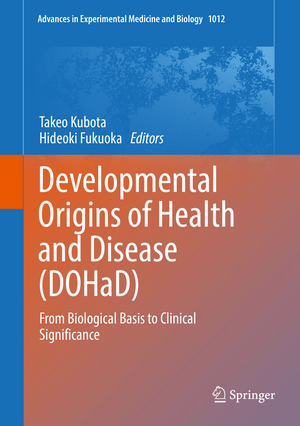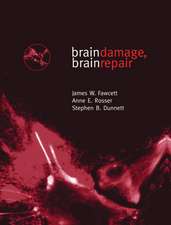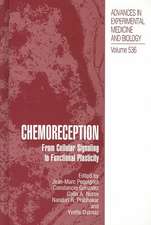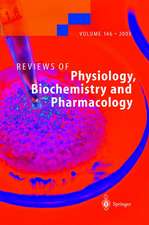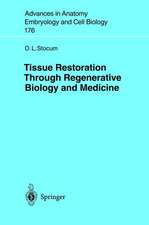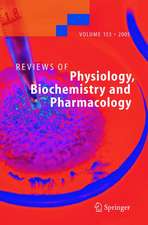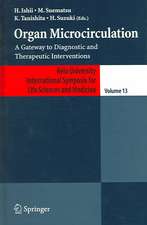Developmental Origins of Health and Disease (DOHaD): From Biological Basis to Clinical Significance: Advances in Experimental Medicine and Biology, cartea 1012
Editat de Takeo Kubota, Hideoki Fukuokaen Limba Engleză Hardback – 12 iul 2018
This book addresses the developmental origins of health and disease (DOHaD), a new medical concept that demonstrates that various adult diseases start in the fetal period. It discusses our current understanding of the molecular mechanisms of DOHaD, including gene body epigenetics and non-coding RNA, and comprehensively examines diseases such type 2 diabetes, a well known as standard DOHaD-associated disease, as well as non-alcoholic fatty liver disease, hypertension and neurodevelopmental disorders. It argues that most adult diseases start at a very early stage, such as in the fetal and neonatal periods, and that earlier prevention and intervention would result in better outcomes for adult diseases such as type 2 diabetes and cardiac disorders, which are increasing in both developed and developing countries. The book appeals to obstetricians and pediatricians, as well as physicians who treat adult patients, wanting to understand the origins of diseases.
| Toate formatele și edițiile | Preț | Express |
|---|---|---|
| Paperback (1) | 1026.51 lei 39-44 zile | |
| Springer Nature Singapore – 5 feb 2019 | 1026.51 lei 39-44 zile | |
| Hardback (1) | 1046.40 lei 39-44 zile | |
| Springer Nature Singapore – 12 iul 2018 | 1046.40 lei 39-44 zile |
Din seria Advances in Experimental Medicine and Biology
- 9%
 Preț: 719.56 lei
Preț: 719.56 lei - 5%
 Preț: 717.00 lei
Preț: 717.00 lei - 5%
 Preț: 717.00 lei
Preț: 717.00 lei - 15%
 Preț: 640.24 lei
Preț: 640.24 lei - 5%
 Preț: 715.71 lei
Preț: 715.71 lei - 5%
 Preț: 716.28 lei
Preț: 716.28 lei - 20%
 Preț: 691.93 lei
Preț: 691.93 lei - 5%
 Preț: 1031.00 lei
Preț: 1031.00 lei - 5%
 Preț: 820.42 lei
Preț: 820.42 lei - 5%
 Preț: 716.28 lei
Preț: 716.28 lei - 15%
 Preț: 641.38 lei
Preț: 641.38 lei - 5%
 Preț: 717.20 lei
Preț: 717.20 lei - 5%
 Preț: 715.35 lei
Preț: 715.35 lei - 5%
 Preț: 1113.83 lei
Preț: 1113.83 lei - 20%
 Preț: 1161.71 lei
Preț: 1161.71 lei - 5%
 Preț: 1170.51 lei
Preț: 1170.51 lei - 18%
 Preț: 1119.87 lei
Preț: 1119.87 lei - 5%
 Preț: 1288.48 lei
Preț: 1288.48 lei - 5%
 Preț: 1164.67 lei
Preț: 1164.67 lei - 5%
 Preț: 1101.73 lei
Preț: 1101.73 lei - 18%
 Preț: 1123.67 lei
Preț: 1123.67 lei - 5%
 Preț: 1435.64 lei
Preț: 1435.64 lei - 20%
 Preț: 1044.10 lei
Preț: 1044.10 lei - 18%
 Preț: 946.39 lei
Preț: 946.39 lei - 5%
 Preț: 292.57 lei
Preț: 292.57 lei - 18%
 Preț: 957.62 lei
Preț: 957.62 lei - 18%
 Preț: 1235.76 lei
Preț: 1235.76 lei - 5%
 Preț: 1231.55 lei
Preț: 1231.55 lei - 5%
 Preț: 1292.30 lei
Preț: 1292.30 lei - 5%
 Preț: 1102.10 lei
Preț: 1102.10 lei - 18%
 Preț: 1132.81 lei
Preț: 1132.81 lei - 5%
 Preț: 1165.19 lei
Preț: 1165.19 lei - 5%
 Preț: 1418.48 lei
Preț: 1418.48 lei - 5%
 Preț: 1305.63 lei
Preț: 1305.63 lei - 18%
 Preț: 1417.72 lei
Preț: 1417.72 lei - 18%
 Preț: 1412.99 lei
Preț: 1412.99 lei - 24%
 Preț: 806.15 lei
Preț: 806.15 lei - 18%
 Preț: 1243.29 lei
Preț: 1243.29 lei - 5%
 Preț: 1429.44 lei
Preț: 1429.44 lei - 5%
 Preț: 1618.70 lei
Preț: 1618.70 lei - 5%
 Preț: 1305.12 lei
Preț: 1305.12 lei - 18%
 Preț: 1124.92 lei
Preț: 1124.92 lei - 5%
 Preț: 1097.54 lei
Preț: 1097.54 lei - 15%
 Preț: 649.87 lei
Preț: 649.87 lei - 5%
 Preț: 1097.54 lei
Preț: 1097.54 lei - 18%
 Preț: 945.79 lei
Preț: 945.79 lei - 5%
 Preț: 1123.13 lei
Preț: 1123.13 lei - 20%
 Preț: 816.43 lei
Preț: 816.43 lei
Preț: 1046.40 lei
Preț vechi: 1101.47 lei
-5% Nou
Puncte Express: 1570
Preț estimativ în valută:
200.25€ • 208.80$ • 166.43£
200.25€ • 208.80$ • 166.43£
Carte tipărită la comandă
Livrare economică 17-22 martie
Preluare comenzi: 021 569.72.76
Specificații
ISBN-13: 9789811055256
ISBN-10: 9811055254
Pagini: 94
Ilustrații: VII, 95 p. 23 illus., 16 illus. in color.
Dimensiuni: 178 x 254 mm
Greutate: 0.45 kg
Ediția:1st ed. 2018
Editura: Springer Nature Singapore
Colecția Springer
Seria Advances in Experimental Medicine and Biology
Locul publicării:Singapore, Singapore
ISBN-10: 9811055254
Pagini: 94
Ilustrații: VII, 95 p. 23 illus., 16 illus. in color.
Dimensiuni: 178 x 254 mm
Greutate: 0.45 kg
Ediția:1st ed. 2018
Editura: Springer Nature Singapore
Colecția Springer
Seria Advances in Experimental Medicine and Biology
Locul publicării:Singapore, Singapore
Cuprins
Part 1 Biological Basis.- One carbon metabolism and lipid metabolism in DOHaD.- Novel models of epigenetic gene regulation in the nutritional environment.- Epigenetic switching and neonatal nutritional environment.- Part 2 Disease and environment.- Developmental Origins of Non-Alcoholic Fatty Liver Disease (NAFLD).- Fetal origins of hypertension.- Involvement of noncoding RNAs in stress-related neuropsychiatric diseases caused by DOCaD theory.- Part 3 Transgenerational mechanism and its consequences.- Placental development and nutritional environment.- Risk of neurodevelopmental disease by paternal aging: a possible influence of epigenetic alteration in sperm.- Part 4 Clinical Significance.- Preemptive epigenetic medicine based on fetal programming.
Notă biografică
Takeo Kubota
Faculty of Child Studies, Seitoku University, Chiba, Japan
Hideoki Fukuoka
Research Institute for Science and Engineering, Waseda University, Tokyo, Japan
Faculty of Child Studies, Seitoku University, Chiba, Japan
Hideoki Fukuoka
Research Institute for Science and Engineering, Waseda University, Tokyo, Japan
Textul de pe ultima copertă
This book addresses the developmental origins of health and disease (DOHaD), a new medical concept that demonstrates that various adult diseases start in the fetal period. It discusses our current understanding of the molecular mechanisms of DOHaD, including gene body epigenetics and non-coding RNA, and comprehensively examines diseases such type 2 diabetes, a well known as standard DOHaD-associated disease, as well as non-alcoholic fatty liver disease, hypertension and neurodevelopmental disorders. It argues that most adult diseases start at a very early stage, such as in the fetal and neonatal periods, and that earlier prevention and intervention would result in better outcomes for adult diseases such as type 2 diabetes and cardiac disorders, which are increasing in both developed and developing countries. The book appeals to obstetricians and pediatricians, as well as physicians who treat adult patients, wanting to understand the origins of diseases.
Caracteristici
Covers numerous diseases associated with DOHaD Presents an update of our understanding of molecular mechanisms for DOHaD Based on the latest biological data Suggests importance of early interventions for adult diseases
